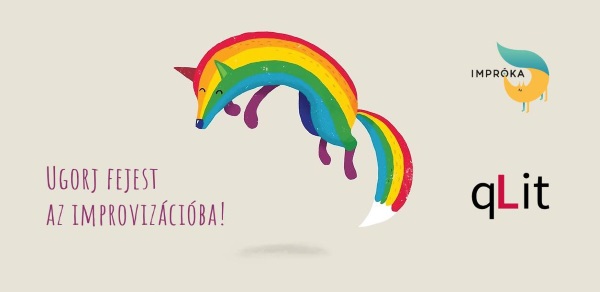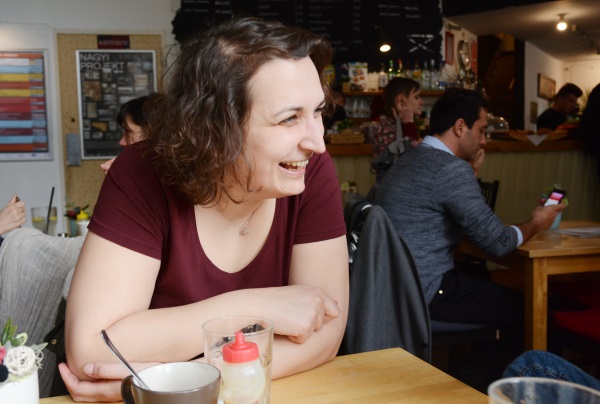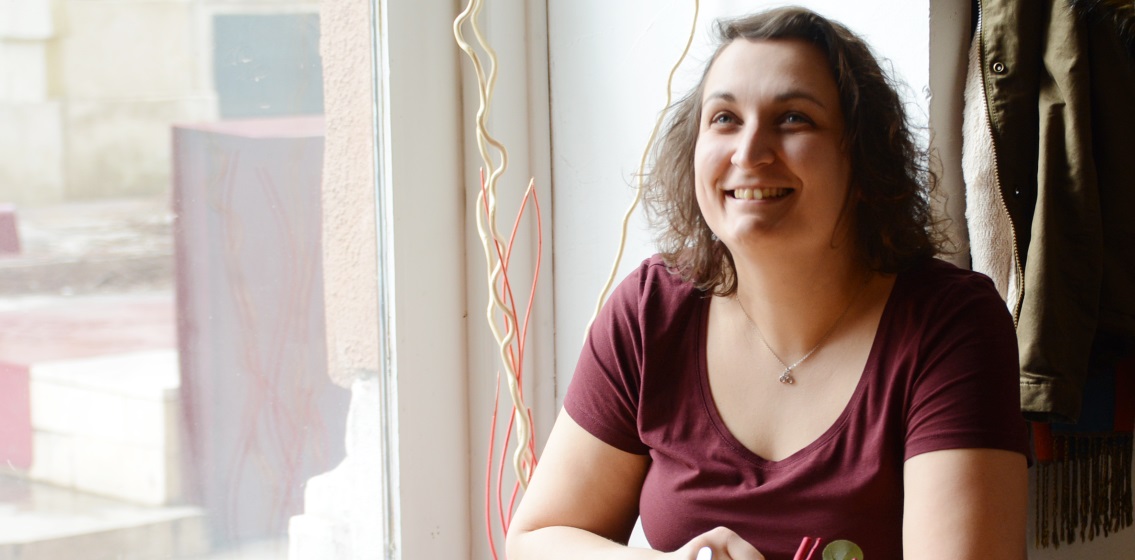The row of qLit programs is expanding. Till now we could meet at table tennis trainings and championships, rapid-dates, pub-quiz evenings and ”Meleg helyzetek?!” improv plays, but soon we are going to offer new opportunities to build the community. From 31st March we can meet, learn and make friends at improv theater workshops open for everybody every second week. We had a chat with Ági Bokor, one of Impróka’s art director and the leader of the workhops about the program and other relating topics.
Don’t you mind if I call you Boki, because everyone calls you like this?
I don’t mind it at all, here and at qLit everybody calls me this way, and I also like it.
Let me start from the distance, back in the day you were a member of qLit, but then you quit, why?
Let’s start with why I became a member of qLit! The thing that I liked about it was that someone finally not just talked about the need of change, but also made a move for it. Later on I started to deal with improvisational theater more and more, and then I didn’t have the time for qLit. But I still follow your work, I like how enthusiastic you are, and with ”Meleg helyzetek?!” we search for connection points.
I know that you started Impróka a year ago, and with Luca Szabó-Szontágh you both are directors. What exactly is it, a business?
I wouldn’t say so. In fact Impróka is an improvisational workshop, making it work with people who like improv the same way we do. We come together, play, think about how improv works if it’s a theater. Because improvisation – though it consists of theatrical elements – is not only important for those who are fond of theatre, but for everyone who works with other people or simply wants to create something from nothing. The members of Impróka are different. The same thing among us is that we are all keen on this genre and we all like to play together, even if it is a performance.
But you not only create performances, but deliver courses for beginners, if I’m right.
Indeed, Luca and I have been giving trainings for a couple of years now, we have been organising workshops where we introduce people into the world of improv. Now it is included in Impróka, we have a beginner and an advanced group.
The improv theater workshop with qLit will be held in tho weeks. What’s going to happen there?
We don’t do a performance. These workshops are about building a community, having fun together. We play and learn together about how we can create something as a team, or just exist. But of course it is not just a teambuilding, because in my view every training has something to do with self-knowledge, we can learn something new about ourselves, too. And if we learn something about ourselves, it can definitely help with dealing with everyday situations.

That is what I just wanted to ask: how can we use these new capabilities?
Surprisingly, the first thought of most of the people is that someone who does improvisation well can lie better. For example when their boss opens the door and sees that they are on Facebook instead of doing their work. Improv is more than this though, I am a really bad liar despite I like impro so much. It doesn’t teach you to lie well, but how to be brave, how to set yourself free, how to accept your own or others’ mistakes. And also how to listen to other people and work with them.
Who do you offer the workshop to? Is everybody able to improvise?
Sure, everyone deserves a shot, everyone learns what they need right then and there. I think it’s important to highlight that the workshop is not LGBTQ-friendly, but a straight-friendly LGBTQ event! It means that you do not have to hide if you’re a member of the LGBTQ community, but we also welcome you if you are not. I’m sure that improv is a fun and useful time, I bet that people who might be a bit shy will finally agree with me if they give it a try.
What is your qualification so that you can organise such trainings?
Exciting question, cause there is no such course today in Hungary - and nowhere else in the world – that gives you this qualification. I went to a lot of trainings, to workshops in Hungary and other countries as well, I played and learnt and eventually I felt a desire to teach it, I also wrote a thesis about how improv can help with drama-teaching. If you ask my occupation I wasn’t far from being a trainer: I went to communication course, I also have a German teacher diploma, and I am a drama-teacher, too.
I have to confess, for me and for others the first thing that comes to mind if I think of improv theater is Péter Rudolf’s „Beugró”. Are they some kind of forerunner?
Kind of, they were the first to do it on TV, so they could do it in front of a large amount of people and be successful with it, but it started before them also in Hungary. The thing that we do is a little bit different than Beugró. We don’t seek entertainment only, but the truth and depth of the characters and scenes. That is why it can be used in such sensitive performances like ”Meleg helyzetek?!”.
What is the difference between the real theater and the improvisational theater?
I can say that in our case neither the lyrics nor the dramaturgy are learnt and practised, we create the scenes from nothing. The performance comes alive in front of the viewer, it happens once and no more.
For me it seems scary and hard to do improvisation. I have to think and play at the same time, so I can continue the story.
But you improvise every day, too! These two things are so easy to synchronise like driving a car and talking to someone at the same time. You can do them both, drive and listen to what the other person tells you.
You said these performances are not prepared. Then how does it work?
First of all there is no play. So there is no written work. There is a show. The show is being written right then. The last time at ”Meleg helyzetek?!” we did a longer play. The audience gave every character a name and an occupation and after that the actors had to play the same character but they can meet anyone during the scenes. That’s how the dentist Barbara and kindergarten teacher Kitti got together, where Barbara’s mother, Eulália, the life coach was not happy about her daughter’s relationship. Kitti had to deal with the taxi driver Mike who tried to pick her up. But luckily Kitti’s anesthetist sibling, Jakab, helped her with the right cokmmunication. From this storyline we did not rearrange anything. It was inspired by what the audience gave us.

”Meleg helyzetek?!” performance that you organise with qLit is a unique way of improvisational theater. Where did the idea come from?
We talked about it with Dorka, one of the founders of qLit, that we should make a play that is suitable especially for the LGBTQ community. The debute was at last year’s Pride, and since then we have had two plays, both were sold-out and successful.
I will not be too PC now! In most of the plays and films the source of humour is the „faggot” thing. We can say it is a great subject. Will you use it too?
There is truth in what you say, but despite it my answer is no. Though our performances are easy, we never say „faggot”, and we not just make people laugh, but also give something to think about. Sometimes the situations are humorous, sometimes they are deep, sometimes the audience realises their own problems or their solutions.
Let me go further! Is it really a good thing to make a special program for the gay community or any other group? Even to homophobic and neo-Nazi groups?
I hope you were just joking as for the second part of the question, but I’m not sure about it though. Let’s not forget that the theater is good when it reacts to the society in which it is created, so as a result I think that until we need sensitiveness, we need such special performances, too. When we finally get to the point that the LGBTQ community members can accept themselves, when they do not have to be afraid whether their parents accept them or their partners, or if they get negativity at work, then these performances become useless. I would be the happiest if it happened.
Do you think it could happen?
In the last let’s say 20 years a lot has changed. And as far as I can see in the right direction. It is also true though that here in Budapest I live in a bubble. It’s not granted that something that works here would work in smaller places, and not because of the lack of interest. So we are on a good path, but I think we still need such sensitization in the next few years.
The interview was done by Tamás Szekeres, cover photo: Katt Kati Kovács.
Translated by Éva Kiss

